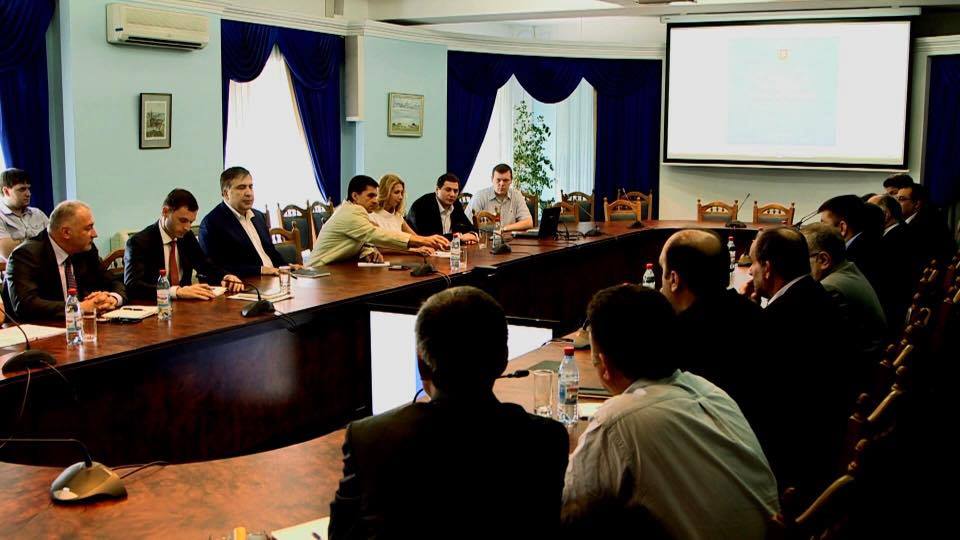Iran has been in the news a lot recently for reasons of non-proliferation (and a much less discussed lifting of conventional arms embargoes in due course).
Yesterday, the Iranian Ambassador to Ukraine, Mr Mohammad Beheshti-Monfaredom together with a fairly large delegation, met with Governor Saakashvili, long-time friend of this blog and head of the Odessa MFA Konstantin Rzhepishevski, and an equally sizable Odessa delegation.
Now, as most of the world is aware, Governor Saakashvili is an “ideas man” (amongst other things). Occasionally it is difficult to discern whether he speaks from an agreed agenda with Kyiv (or others), whether ideas simply come to him mid-sentence and are blurted out without due consideration, or whether his preconceived ideas are “dangles” with the tacit approval of Kyiv (or others) for whichever audience he is addressing (or is listening internally or externally but not actually present in the room).
During yesterday’s meeting with the Iranian Ambassador and delegation, Mr Saakashvili dropped the “idea” of an Odessa Development Fund based upon the Singaporean model, and announced the first “Oblast Council for Economic Development”.
The plan then, to turn Odessa into some form of a “city-State”, based upon incorruptibility, high efficiency and vitality? A model reformation for the nation?
Well why not - at least within the parameters of Ukrainian sovereign integrity and unity?
The USA has clearly labeled Odessa as the front line for the fight with corruption, which can only help (for the most part) rather than hinder the Governor’s vision. To paraphrase W Clement Stone, there’s nothing wrong with aiming for the moon, and if you miss hitting a star - although it is a wise politician that manages the expectations of their constituents.
Ignoring the very high concentration of millionaires Singapore boasts, as well as being an established trading centre in southeastern Asia, there is a lot that Odessa can and should emulate - starting with the efficient and consistently incorruptable One-Stop-Shop planned to begin work in October.
If Odessa doesn’t have the power to repeal the now 20+ Ukrainian laws (and the list is still growing at the Oblast Administration) that simply stifle and complicate business, it can at least make the bureaucratic process as swift, cheap, and painless as possible. Likewise the streamlining of property registration and unbiased enforcement of contracts within the Oblast would also go hand-in-hand with the idealism behind the One-Stop-Shop. In all these things Singapore excels, though it has the ability to change the laws as a sovereign State, unlike an Oblast within Ukraine.
Infrastructure, education, efficiency in public administration and services, innovation, political stability and rule of law, are also the hallmark of Singapore.
Odessa on the other hand, currently can claim to have the education (although some centres of excellence would seem a good idea) and a certain amount of innovation (the latest i-Hub in the city courtesy of the sovereign fund of the Kingdom of Norway), but nothing approaching quality or sustainability in any of the other areas.
That said, the US is investing a huge amount of political and diplomatic energy in the Oblast directed at rule of law, customs and customs procedures, and advice upon civil service reform.
As your author told the last US diplomatic mission, (and hopefully it was their “takeaway”), to reform Odessa Oblast (and city) there needs to be three things - rule of law, structure and sustainability. The rest will sort itself out fairly swiftly without any heavy-handed or overly intrusive governance.
There is a long way to travel, and it will be a marathon and not a sprint, but both marathon and sprint begin with the first step - and those first steps (even if some are rather unstable) are being taken. Hopefully it will not be a case of one step forward, two steps back, but undoubtedly there will be some meandering and mis-steps along the way.
If there is to be a rule of thumb regarding reform and anti-corruption measures for the Oblast, it should be one that makes it quicker and cheaper to do things legally, than it is to resort to corruption and cronyism to get things done. Quite simply, undercut corruption and cronyism for speed and cost throughout all Oblast bureaucratic machinery.
There are, of course, issues with sustainability for Odessa should this Singaporean model prove to be even half-way successful, but such issues are a long way down the road.
The Iranians expressed interest in certain areas of development - specifically in infrastructure and agriculture. (Unsurprisingly, as recently France has also stated interest in development in exactly the same areas within the Oblast, and China is many $ billions “in” already over the past 5 years, as are corporations like Cargill for $ hundreds of millions.)
Whether or not Governor Saakashvili’s “city-State” Singaporean “Odessa Development Fund” and “Oblast Development Council” concepts have been run passed Kyiv, or whether he sees such scope within the “decentralisation” of powers to the regions due before the year end and thus hasn’t mentioned the idea, is a question worthy of asking - for the Singaporean model involved a good deal of governmental intervention and planning (albeit not a rigid plan) that on occasion swung as a pendulum between “plan” and “free market”. Indeed, during its rise to economic stardom, the best possible label to put upon the Singaporean model is probably “structural”.
Rule of law, structure and sustainability - three reoccurring themes in this blog.
Whatever the case, and it is extremely unlikely Odessa will be the next Singapore as much due to Ukrainian politics as anything else, if the only part of the model that is adopted and consolidated is incorruptible efficiency, that would qualify as a major success in and of itself.
